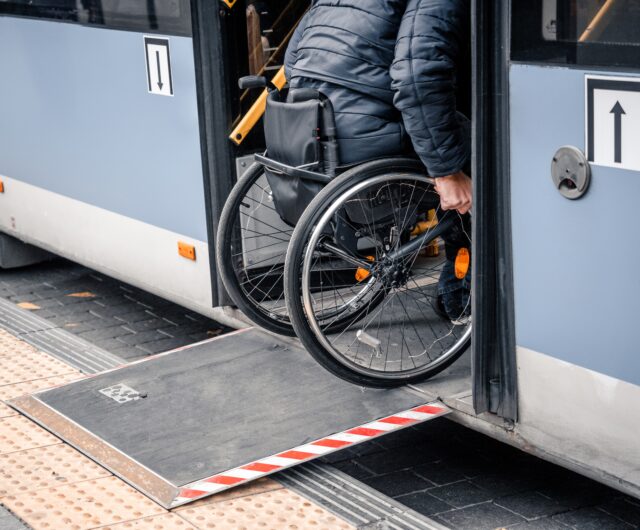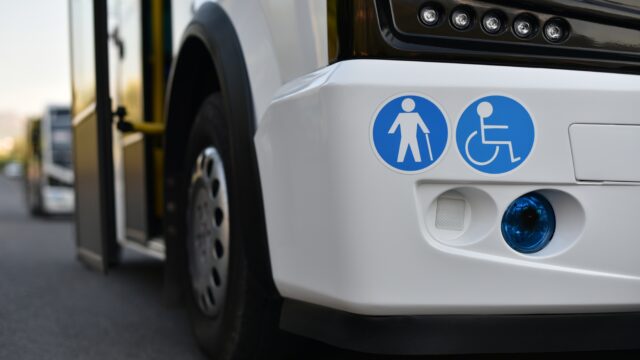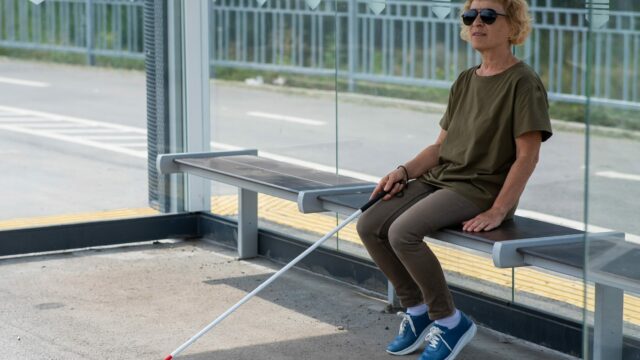Highlighting access equity in transport: CILT supports Catch the Bus Month

Accessible transport isn’t just a convenience – for many, it’s a lifeline.
In the United Kingdom, where approximately 16 million people live with disabilities, accessible transportation systems can make a huge difference in facilitating independent living.
Statistics show that those with disabilities often rely more heavily on public transport systems than others in navigating their daily lives. From visiting the local shops to getting to work or school, trains and buses are imperative to many disabled people across the country and indeed the world.
Resultantly, when accessibility is overlooked, the consequences ripple far beyond the transport sector. Individuals can be isolated, unable to access essential services, or even socialise. This not only has a negative effect on personal well-being, but also impacts the economy more broadly.
Public transport should be a service for everyone. Yet, without inclusive design, it becomes an obstacle for many – older adults, parents with strollers, and those with temporary injuries included.
Unfortunately, despite its importance in ensuring that everyone has mobility freedoms, accessibility hasn’t historically been a priority in transport systems, and even today continues to be undervalued in cases. Indeed, while accessible journey information has been available onboard some UK bus and coach services for the past two decades, over half of the vehicles used on local services across Great Britain remain unequipped to provide it.
Advocacy groups drive significant impact
Fortunately, awareness of these challenges is growing, with increasing efforts from both transport providers and advocacy groups to address the most pressing issues.
One organisation making a significant impact is Bus Users UK. In its role as the Alternative Dispute Resolution Body for the bus and coach industry, and the designated entity for handling complaints under Passenger Rights in Bus and Coach Legislation, it plays a pivotal role in championing inclusive and accessible transport.
A key part of the charity’s work includes initiatives such as Catch the Bus Month, which this September focuses on the critical theme of accessibility. Campaigns like these are crucial in pushing accessibility to the forefront of public transport priorities, and they’re making a difference.
The latest annual Bus Users Accessibility Audit from Bus Users UK reflects this positive shift, highlighting the growing momentum toward more inclusive transit networks. Here, some of the key findings include:
- Operators are increasingly working in partnership with passenger groups to improve accessibility, involving them directly in service design and delivery.
- Technology is the most popular communication method for disabled passengers, but operators are expanding the use of printed materials, virtual and face-to-face meetings to combat digital exclusion.
- Staff training in disability awareness, mental health first aid, and travel confidence schemes are on the rise, with many operators incorporating these into standard training.
- A significant number of operators now include on-board training for Guide Dog puppies and offer a wider range of card and lanyard assistance schemes.
- Operators are also focusing on improving vehicle design, collaborating with community groups, and launching initiatives to help passengers familiarise themselves with buses to boost travel confidence.
Several hurdles still remain
These efforts highlight the growing emphasis on accessibility in UK public transport services. However, the latest audit also shows that there’s still much work to be done.
Some buses continue to fall short in key areas. While it’s encouraging that more operators are offering disability awareness training, it’s concerning that only 89% of those surveyed provide this training to their drivers – a figure that should be nothing less than 100%.
Equally troubling is the year-over-year drop in the percentage of buses required to pull into every stop even if there are no passenger signals, falling from 65% in 2022 to 52% in 2023. Although this practice might add a few minutes to each journey, it’s a straightforward, cost-effective way to maximise accessibility and prevent disadvantaged passengers from being stranded.
Additionally, other critical gaps remain. For example, 22% of providers don’t require drivers to wait until passengers are seated before pulling away, highlighting a significant area for improvement in passenger safety and comfort.
Such shortcomings require continued action and change to achieve truly accessible public transport on a widespread basis.
CILT strongly supports ongoing accessibility improvements
Here, policy undoubtedly has a key role to play.
Indeed, several initiatives have had a hugely positive impact in enhancing accessibility, such as the English National Concessionary Travel Scheme that has provided free local bus travel to eligible older people and eligible disabled people on bus services since its introduction in 2008.
However, it is now hoped that the new Public Service Vehicles (Accessible Information) Regulations will serve to bridge some of the gaps highlighted by Bus Users UK.
Here, the UK government has confirmed that, “between 2024 and 2026 it will become mandatory for the majority of local bus and coach services to incorporate accessible information provision, improving the journey experience for all passengers, including passengers who are disabled”.
Specifically, the regulations have been designed to achieve the following key outcomes:
- Ensure that all passengers have access to high-quality, accurate on-board information whenever they travel on local bus and coach services.
- Break down existing barriers to access, making public transport more inclusive.
- Enhance the overall journey experience for every passenger.
It is policy changes and awareness initiatives such as these that are incredibly important to ensuring that accessibility becomes an even greater priority within transport networks, not just across the UK, but globally.
From regulatory improvements to charity initiatives, CILT is fully behind these efforts.
“Accessible public transport is fundamental to any truly inclusive and equitable society, ensuring that everyone, regardless of ability, can fully engage in daily life,” says Chief Teete OWUSU-NORTEY FCILT, International President of CILT. “Anything that can be done to improve journeys and experiences will not only benefit current transport users, but also encourage others to more readily use these critical, sustainable public transport services.”
As progress continues, CILT aims to further champion efforts regarding improved transport accessibility, as well as other meaningful transport and logistics initiatives globally.
“With our international family, CILT is uniquely placed to support and promote best practice and learnings from around the globe,” adds Sharon Kindleysides FCILT, Secretary General at CILT. “It is important that we support our community of transport professionals in providing passenger focussed and accessible services that give people the freedom to live their lives to the fullest.”
As a global organisation, we’d like to encourage our community to share their thoughts and perspectives on regional transport accessibility opportunities and drawbacks. If you would like to help us expand our thought piece, please share your views with us.
Accessibility within public transport impacts communities globally, not just in the UK. We understand how improving global transport accessibility is vital and we would like to hear from our community to understand some of the current acessibility challenges and opportunities you have experienced at a local level.
Please take a few minutes to complete our survey and to share your thoughts with us.

Accessible buses aren’t just a convenince; they’re a lifeline for many, enabling people with disabilities, the elderly and those with limited mobility to lead more independent lives.
As part of our participation in Catch the Bus Month, we would also like to encourage our global community to participate in the initiative throughout September, to make a global impact.
- Share your thoughts, experience and ideas on transport accessibility, in your region
- Submit your thought leadership pieces in the form of articles, papers, podcasts, videos and any other suitable media
